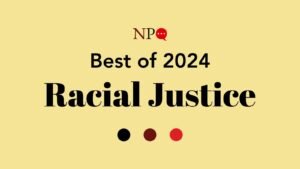
In 2020, organizers and funders in California came together to collaborate and share ideas on how to increase 501(c)(3) and 501(c)(4) dollars in the state. As the public health crisis around the COVID-19 pandemic emerged and activists across the country brought the ongoing fight against racial justice to the forefront, it became clear that there was a deep need and desire for investments in power building to advance structural reforms. From these conversations, the idea for PIVOT (Powerful Innovations for Voter Organizing and Transformation) was born.
PIVOT is a unique collaboration because organizers and funders work together on the front end to best understand where funders can allocate resources to uplift organizations working to build political power, advance racial justice, and bring about structural change. This week, the initiative announced funding for 14 regional and statewide organizations, coalitions, and networks doing such work. Each group will receive between $250,000 and $1 million.
“I think COVID and the uprising of Black folks in 2020—I think that really just set the fire that we needed to say, ‘The time is now.’ It really put us into fundraising mode. We had a goal of initially fundraising $9 million for the first year. We fundraised a little over $7.5 million in grantmaking and really just made the decision to take on the hard work of creating this dynamic process,” said Diana Colín, the director of PIVOT, in an interview with NPQ.
“I think COVID and the uprising of Black folks in 2020…set the fire that we needed to say, ‘The time is now.’ It really put us into fundraising mode.”
Colín also serves as a program officer for the California Community Foundation (CCF). CCF is where PIVOT is housed, and it is also one of its funders. At the time when the initial conversations around the formation of PIVOT were taking place, Colín was the civic engagement and political director for the Coalition for Humane Immigrant Rights (CHIRLA). Colín says that being able to experience the initiative in various sectors—as a practitioner, funder, and staff—has been helpful.
Jung Hee Choi is part of PIVOT’s steering committee. With over 20 years of power building, organizing, and narrative communications experience, she is also the senior advisor of narratives and strategic initiatives for Power California—an alliance of over 20 youth organizing groups in the state that is working to build the electoral power of young voters of color.
In an interview with NPQ, Choi said she is drawn to PIVOT’s work because it “recognizes the important role that power building and organizing plays in advancing systemic structural change in California.”
Organizing to Build Power
“We really need to fund and resource organizations to be able to do this work year-round—not just at election time or…just narrow limited GOTV.”
Although California is often heralded as one of the country’s most progressive states, Choi believes it is important to remember that it did not get this way overnight. She recalls, for instance, how efforts to ban affirmative action started in California in the 1990s—decades before the recent US Supreme Court decision. She also notes that the state was the site of Proposition 187, a ballot initiative that prohibited undocumented immigrants from utilizing public services like healthcare and education.
“That was only 20 [or] 30 years ago, and now California is recognized as this multiracial, diverse, liberal state, and it is, in many ways. It’s moved in this more progressive direction, but I would argue that a lot of that work and progress is due to the organizing and power building work of organizations on the ground who’ve really worked to build political power.” Choi said.
Choi also points to the disproportionate incarceration of Black and other people of color, the high rates of homelessness, and the housing affordability crisis as examples of why the state still has a long way to go.
“We have so much more to do and so much more to go. We really need to fund and resource organizations to be able to do this work year-round—not just at election time or to do just narrow limited GOTV [get out the vote],” Choi said.
“We’re strengthening the statewide ecosystem, but also helping the local infrastructure grow by supporting the smaller regional organizations.”
Funding the Future
Diana Colín noted that of the 14 organizations PIVOT is funding, eight are at the regional level, while six are statewide organizations. Nine are organizing infrastructure; five focus on narrative infrastructure.
A key part of the funding, Colín added, is that the grants are to scale because they wanted the organizations to be able to hit the ground running and not have to worry about having to do additional fundraising.
“We are making sure that we’re strengthening the statewide ecosystem,” Colín said, “but also helping the local infrastructure grow by supporting the smaller regional organizations. It’s just a good mixture of organizations that are having bold projects, and those projects are taking action to protect our democracy, win economic equity, and advance racial justice across the state.”












